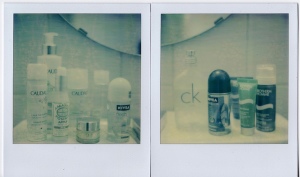I like to think of myself as a consumer who is fairly conscious of health and environmental issues. I am a recycling obsessive, I carefully consider what I eat and I avoid buying products which I know could be difficult to dispose of once I’ve finished using them, such as detergents and aerosols.
But a recent trip to the US has reignited my ongoing concern with the chemicals in the beauty products which we use daily, and which seem largely to go undiscussed in the mainstream beauty media in the UK. Many US companies are now mentioning the absence of these ingredients, such as parabens, sodium laureth sulphate and others, as part of the marketing campaigns for their products.
I first became concerned about this problem after watching (the arguably over-exposed but, I think, ethically sound) Sarah Beeny in her 2007 programme for Channel 4, How Toxic Are You? As a ‘celebrity’, she gained a mixed reaction from the press, who largely chastised her for what was perceived as unscientific naivety. She was worrying about the fact that the products we use on our bodies, including deodorants, moisturisers and shampoos, are not ‘natural’ when we are constantly surrounded by chemicals and artificial products.
 Some scientists have suggested that there could be links between the parabens (which act as preservatives) used in deodorants and breast cancer risk, as they may mimic the effects of oestrogen. However, scientists and charities, such as Breast Cancer Campaign in a letter responding to a Sun report on the topic, are quick to emphasise that these claims are not backed up with reliable evidence and cannot be used to proclaim the use of these products dangerous, since there are so many other sources of parabens within our environment.
Some scientists have suggested that there could be links between the parabens (which act as preservatives) used in deodorants and breast cancer risk, as they may mimic the effects of oestrogen. However, scientists and charities, such as Breast Cancer Campaign in a letter responding to a Sun report on the topic, are quick to emphasise that these claims are not backed up with reliable evidence and cannot be used to proclaim the use of these products dangerous, since there are so many other sources of parabens within our environment.
So, I am undecided really. Having spent quite some time scanning the ingredient lists of UK beauty products, there are definitely beauty brands in the UK which avoid some of these so-called dangerous chemicals. These include Good Things and some very high-end products like Avène and La Roche-Porsay. However, it does not seem to have reached the levels of the US market where television adverts mention the ingredients (or lack thereof); we seem to hear more about things being ‘Organic’ or ‘97% natural’, which could mean that the other 3% is bleach after all.
I’m not a scientist and, as far as I can see, the jury is still out on whether these chemicals really do cause us harm directly. Is this just a case of ‘time will tell’, an approach which ought to cause concern when we consider that the PVCs in cling film, for example, were once thought harmless. I do have a sneaking suspicion that the US marketers are pandering to consumer concerns rather than addressing any scientific need, though. It’s no coincidence that the brands which use fewer of these chemicals seem to be more expensive.
What do you think? Do you worry about the ingredients in your shampoo? Or do you feel more inclined to stick with a brand you’re familiar with and can afford, rather than lose sleep over whether there are risks?
Time will tell, I suppose.

I think this is a great post! It can be scary if you think too much about the chemicals going into these products, even the ‘natural’ products! I think you can’t go around constantly fearing that the things you use on your body might cause cancer, there are a lot of things out there that are said to cause cancer but no one is really sure. Be careful I suppose, try to get a better idea of the products you are using but don’t become a hypochondriac!
Awesome post!
Mel. x
http://thefashionjourno.com
http://www.facebook.com/TheFashionJourno
Thanks, Mel, I’m really pleased you liked the post. I would definitely agree with you that it’s important to keep a sense of perspective with these things, but that thinking twice about some of the products you use is sensible!
Thanks for your comments.
Sophia x